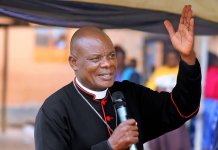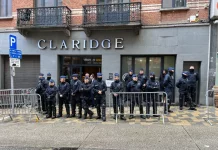The Archbishops’ Commission for Racial Justice has released the first of its biannual Racial Justice reports.
Mandated to drive ‘significant cultural and structural change on issues of racial justice within the Church of England’, the Archbishops’ Commission for Racial Justice (“ACRJ”), headed by The Rt Hon Lord Paul Boateng, is charged with monitoring, holding to account and supporting the implementation of the forty-seven recommendations of the Racial Justice Taskforce which were laid out in the Taskforce’s comprehensive 2020 report From Lament to Action.
In his foreword letter to the First Report, Lord Boateng writes, “This is a painful process, and necessarily so, in that the response to an examination of racism and the exposure of injustice is often one of denial and defensiveness or obscuration and delay. This must not go unchallenged.”
Released today, the Commission states:
“In this, the first of the six reports the ACRJ will produce, we have outlined the beginning of this work, reporting on the formulation of the seven workstreams in the last three months, and the progress of work on the five priority areas and the forty-seven recommendations identified in From Lament to Action. Subject to the availability of appropriate support and resources, the Commission will produce a further report by the end of 2022 and will report twice a year thereafter. The Commission will conclude its work in October 2024 with a final report drawing the work of the three years together.”
Lord Boateng, commenting further in his foreword letter on the issues of the resources required to implement the Taskforce and the ACRJ’s recommendations says:
“We have taken the view that a minimum of £20 million needs to be set aside…to fund the delivery of From Lament to Action, and to meet the cost of such recommendations that we make within the lifetime of the Commission.”
The Report makes clear the importance of each Diocese within the Church of England developing a Racial Justice Strategy to as to make the most impact with the resources available, and sets a time limit for this [Patronage, Governance & Funding, Page 39]
The Report makes comment on the issue of monuments and slavery and calls for a strengthening of the guidance issued in this regard to create an appropriate balance with respect to the planning requirements for historic conservation so as to stress the paramount importance of equitable access to Christian worship, and which reflects the Church’s commitment to racial justice. [Slavery, Page 21]
The Report also highlights the need for wider reform of the Church of England’s Consistory Court process and calls for greater diversity and inclusion in its administration. [Slavery, Pages 23 & 24]
Commenting on the first Report, the Archbishop of Canterbury, the Most Reverend Justin Welby, said: “We strongly welcome the first report of the Commission on Racial Justice and the clear, independent scrutiny it provides. I am very grateful to Lord Boateng and his Commission members for the work they have done so far. This report identifies the difficult and long path to eradicating the pain and injustice felt by so many, but provides us with hope that through the Commission’s work, these issues will be addressed.”
The Archbishop of York, the Most Reverend Stephen Cottrell added “We are encouraged to see the work of the Commission in challenging current practice and stimulating culture change in the Church of England. It is important for us to engage with these ideas and continue to build both support and action. This reminds us that justice lies at the heart of the Gospels and it is our hope that the whole Church will be inspired to commit in earnest to this transformation.”
Notes to Editors
The First Report of the Archbishops Commission for Racial Justice is available to download here
The Commission reports to the Archbishops every six month with recommendations to help the Archbishops fulfil their commitments to identify, respond to, and root out systemic racism in the Church.
In addition to London, the Commission has held meetings in York, Bristol, Manchester, Liverpool and Durham. These meetings have been designed to receive input from a wide variety of sources – Diocesan clergy, academics, conversation partners. The meetings have also had presentations from senior members of the National Church Institutions on those aspects of their work relating to the Taskforce Recommendations and the Commission’s focus. Lord Boateng spoke at the February General Synod, and Commission Members will be attending General Synod in July 2022.
Full Membership: Archbishops Commission for Racial Justice
• Chair: The Rt Hon Lord Boateng, Former Cabinet Minister and High Commissioner to SA
• Professor Anthony Reddie, Dept. of Theology, University of Oxford
• The Revd Canon Dr Chigor Chike, Chair of Anglican Minority Ethnic Network (AMEN)
• Professor Duncan Morrow, Dept. of Politics, Ulster University
• Dame Melanie Dawes, Chief Executive, Ofcom
• Professor Mike Higton, Dept. of Theology, Durham University
• Lord Wei of Shoreditch, Serial Social Entrepreneur and Social Reformer
• Dr Nirmala Pillay, School of Law, Leeds Beckett University
• The Revd Canon Patricia Hillas, Chaplain to the Speaker of the House of Commons
• The Revd Canon Dr Philip Anderson, Canon Precentor, Liverpool Cathedral
• The Rt Revd Rose Hudson-Wilkin, Bishop of Dover
• The Revd Sonia Barron, Diocesan Director of Vocations, Diocese of Lincoln










